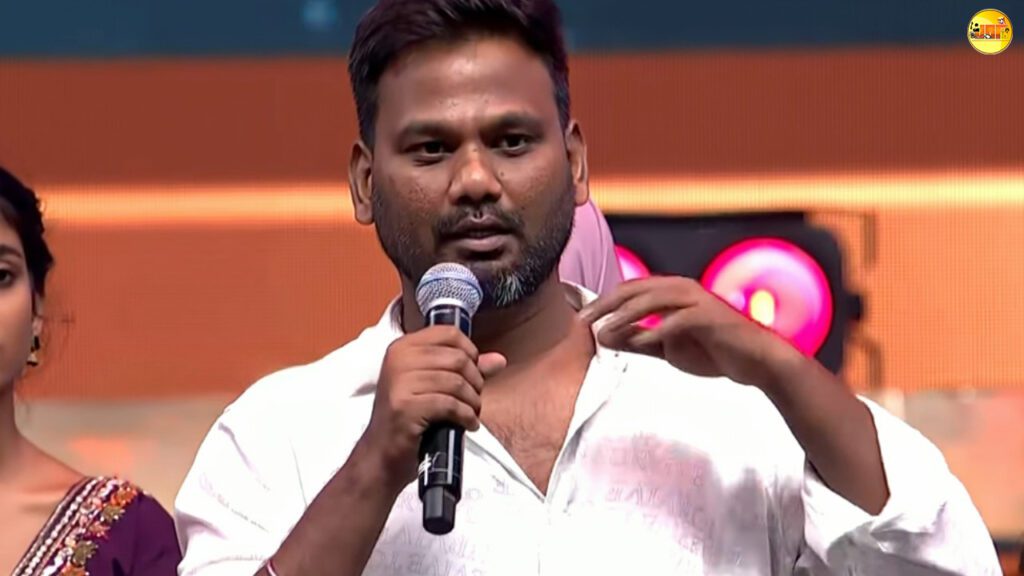Speaking at a convention recently organized by the name of “Kalviyil Sirandha Tamil Nadu”, Lubber Pandhu director Tamizharasan Pachamuthu made an eloquent speech lauding government welfare schemes, comparing his personal journey from recipient of free education kits to the beneficiary of an engineer’s degree. His speech touched many hearts particularly academicians and those who belong to lower sections of society because he had linked state aid with his realization of success and made an appeal for education social justice.

His remarks capture the intersection of personal narratives with public policy, the intersection of art figures sometimes becoming spokespersons of the commoner, and the intersection of education providing the best lever for altering lives. In this article, I break down his speech, background, reactions, and ramifications of the same upon Tamil Nadu’s education and social atmosphere.
Who Is Tamizharasan Pachamuthu ?
Before the speech, a brief about him and the film. Lubber Pandhu is a Tamil sports drama that was released in the year 2024 by Tamizharasan Pachamuthu who is a first-time director. Harish Kalyan, Dinesh, Swasika, etc. are present in the cast of the film. It revolves around issues of struggle, social boundary, caste issue, etc., as well as passion for cricket in Tamil rural culture.
Tamizharasan’s personal history is integrated within his speech: he presents himself as a student from a government school who had benefited from Tamil Nadu’s free education policies like free bus passes as well as from “first generation graduate” support. In his speech, he acknowledged the state for such policies saying they helped him become an engineering graduate.
So when he speaks of welfare policies, he does not mean abstraction but lived experience , giving weight to words.
Key Highlights of the Speech: Gratitude, Context & Pragmatism
Acknowledging Free Education Schemes
Tamizharasan started by saying: “I also belong to a government school. I have benefited from numerous free schemes such as the free bus pass, first generation education benefit etc. Because of those I studied and obtained my degree in engineering.” He expressed gratitude towards the Tamil Nadu government specifically by providing those opportunities, and stated that he feels indebted.
He also praised the Kaalai Unavu (morning meal) program stating that he himself felt the value of such programs for children from poor backgrounds. He recalled that he himself used to travel by bus 12 km from a village (Arangoor perhaps) just to go school and gain education, and compared mid-day/morning meal nourishment as crucial assistance that facilitates concentration by the student.
Speaking from a Modest, Rural Origin
Tamizharasan stressed his origins from an middle class, rural background. He mentioned that his family wasn’t very wealthy; “Idly-kari” (plain food) was occasional—just on Diwali or Pongal, not daily. He mentioned that from such humble origins, he appreciates how each of these welfare schemes makes a difference for those from small villages who are studying
He drew a comparison between that and the way that other individuals assume privilege over success, or say things like “Ilaiyaraaja, AR Rahman—did they study?” He warned the learners not to assume stereotypes, as many who do succeed did study, rather than by chance or talent only.
Political & Social Justice Undertone
Apart from gratitude, his address had a gentle political resonance: appreciation of the government’s social welfare, calling upon its extension to the poor, and a gentle nudge at listeners that such schemes need not only benefit urban or privileged classes. He tacitly endorsed an idea of pluralistic growth wherein education and welfare continue to be instruments of equality.
He also mentioned that he had indeed been present at the ceremony only because he wanted to thank the government for such initiatives that by most are overlooked, specifically while sitting at the midst of the crowd he could observe numerous learners as well as education leaders.
Reactions & Media Echo
On Social media, education activists and some of its students shared snippets of his speech, hailing them as inspirational. Quotes like “One who benefitted speaks best” and “This is what a responsible artist does — reminds us of systems” were common.
Film circles also noted that Tamizharasan previously made waves by defending actor Sivakarthikeyan from trolls after he congratulated peers, demonstrating that he values community endorsements from fellow filmmakers.

